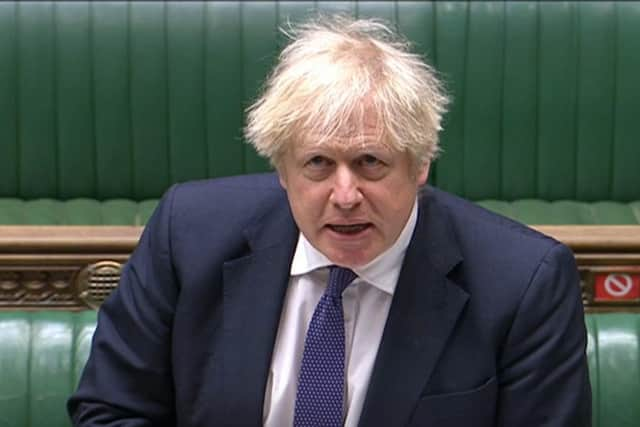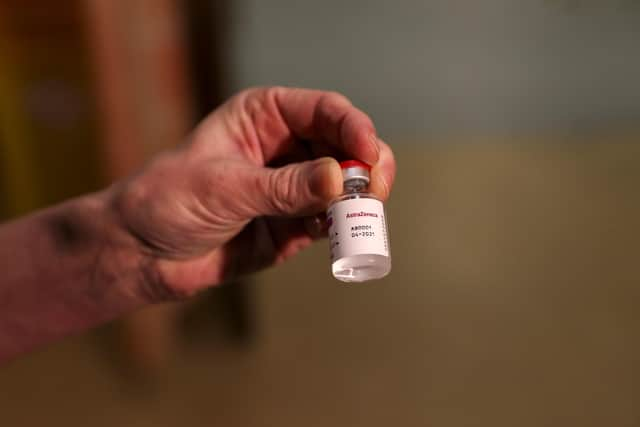Does doctor really know best over lockdown? – David Behrens
“It’s the sort of lockdown where you can still get things done,” said the masked estate agent who pitched up at Behrens Towers on Tuesday morning. It was as good an explanation of the new rules as any I’ve had so far.
Given that house viewings appear permissible as part of our 30 minutes of daily exercise, I started the ball rolling on selling mine. Half an hour isn’t really long enough to choose a home – it takes me longer than that to decide what to order at Wetherspoons – but few conventions are as they were.
Advertisement
Hide AdAdvertisement
Hide AdThe feeling of empowerment that came from seizing back control of at least one part of my life made headlines like Wednesday morning’s easier to bear. “Restrictions could return next winter despite vaccine,” it read.


It quoted a warning from Professor Chris Whitty, England’s chief medical advisor, that while viruses decrease over time, they seldom vanish. Take the flu, he said: there has been a vaccine for years but people still catch it.
There is sense behind this but also nonsense. The fact that we have never sought to restrict anyone’s movements in the face of a flu epidemic weakens the argument for continuing to do so for Covid.
Advertisement
Hide AdAdvertisement
Hide AdIt’s like being told for the tenth time by our GP to take more exercise if we wish to reduce our blood pressure. We know he’s right, yet no sooner have we left the surgery than we’re back at Wetherspoons, exercising only the arm we use to lift pint glasses.


We do this because the final decision is our own, and there is always a part of us which questions the adage that Doctor Knows Best. The advice he dispenses may cure the immediate symptoms but only at the expense of quality of life and the beneficial effect it has on our state of mind.
This internal system of checks and balances is notably absent at the moment. We have temporarily accepted doctors’ orders as holy writ because our human instinct to preserve life has overridden all else.
But the arrival of mass vaccinations alters the balance. The most vulnerable people will have been protected and the vulnerability shifted to those whose livelihoods vanished in the lockdown.
Advertisement
Hide AdAdvertisement
Hide AdWith no timetable for moving on, we will realise that we are hunkering down to protect institutions rather than individuals. And no matter how fond we are of the NHS, that’s something we won’t put up with for ever.
The proof of this came on the same day as Professor Whitty’s warning, and from his own area of government. Public Health England reported that there had been more than 350,000 hospital admissions during 2018/19 that were attributable to alcohol-related diseases and injuries. That’s nearly 7,000 a week – a figure of coronavirus proportions.
The drain on the system of treating so many patients is incalculable but avoidable. The law could clamp down on drinking; it could ban the advertising of alcohol in the same way as cigarettes, or charge people for their treatment. Many in the medical profession would welcome some or all of those measures, and understandably so, but society at large would not countenance such restraints.
Advertisement
Hide AdAdvertisement
Hide AdAs the vaccine makes Covid as preventable as overindulgence, our fear of it will diminish. We will continue to take precautions but there is a world of difference between precaution and restriction.
The restlessness is already palpable. Sir Keir Starmer has demanded round-the-clock vaccinations and Boris Johnson has promised to use “every second” in the coming weeks to shield the vulnerable. Yet as he spoke, leaked documents suggested that Public Health England – an organisation beholden to us all for our forbearance – had decided not to work on Sundays to deliver vaccines to hospitals, nor after lunchtime cut-off points, even if supplies were running low.
At the same time, the World Health Organisation discredited Britain’s plan to delay the second dose of vaccine for 12 weeks, instead of the recommended six. And while that is a matter of medical opinion, the urgency of the rollout – and its transparency – is not.
So, when this is finally over, our checks and balances restored and the Behrens estate under new ownership, will we go on believing that Doctor Knows Best? Or will we want a second opinion?
Advertisement
Hide AdAdvertisement
Hide AdSupport The Yorkshire Post and become a subscriber today. Your subscription will help us to continue to bring quality news to the people of Yorkshire. In return, you’ll see fewer ads on site, get free access to our app and receive exclusive members-only offers. Click here to subscribe.
Comment Guidelines
National World encourages reader discussion on our stories. User feedback, insights and back-and-forth exchanges add a rich layer of context to reporting. Please review our Community Guidelines before commenting.